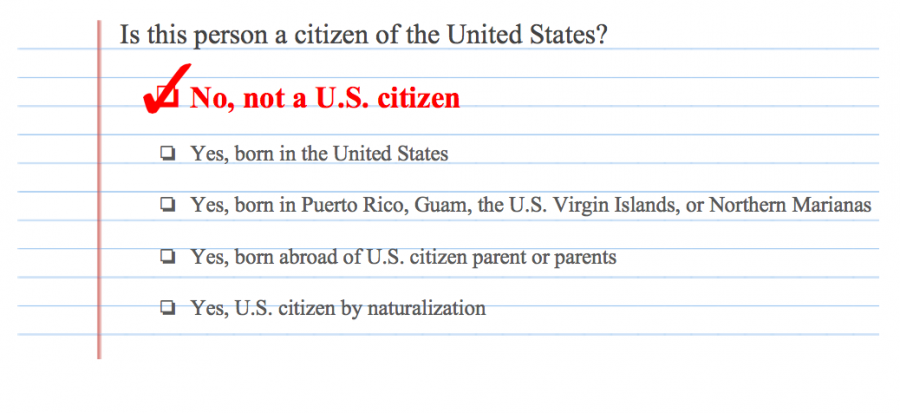Capitol Hill: What You Missed (Volume 19, Issue 7)
Michael Eng and Saloni Shah
President Trump announced the addition of a question on the 2020 census that would ask individuals whether they are citizens. Such a question is raising concern of undercounting and biases against immigrants.
May 7, 2018
The U.S. Department of Commerce announced the reintroduction of the citizenship question on the upcoming 2020 decennial census on March 26. This marks the first time the question has been in the census since 1950. As a result, the State of California is suing the Trump administration over the controversial decision.
The citizenship question on the decennial survey raises questions about the Trump administration’s intent, since the citizenship status is already covered by other surveys, like the annual American Community Survey, to enforce the Voting Rights Act. Moreover, according to the U.S. Census Bureau, questions on the decennial survey usually pass through about five years of testing, but this announcement passed through at the very last minute.
The main purpose of the census mandated by the U.S. Constitution is to get an accurate headcount of the U.S. population, not the number of citizens. Although respondent data confidentiality is protected by the law, concerns about drawing attention via their answer to the citizenship question may deter people from filling out the form.
“If people know the data is confidential, I do think they would be okay filling it out. There are a ton of people who don’t know that the data is confidential,” Civil Rights Attorney Nick Kuwada of the Asian Law Alliance (ALA), based in San Jose, said. “To include this question only further divides our community from people who can help [undocumented immigrants].”
The number of people counted in the state in the census determines the allocation of federal funds.
“For the most part, there is always going to be some level of undercount,” Kuwada said. “Any sort of movement to make the census less desirable for people to be counted would drastically reduce millions and even billions of dollars to states who desperately need that aid.”
The citizenship question can dissuade immigrants and noncitizens from answering the survey in huge numbers. This undercounting can lead to a two-fold effect in states with large numbers of foreign-born people and non-citizens, such as California and New York.
Since census data is used to calculate the number of seats in the House of Representatives, census undercounting could shift political power.
Pratheepan Gulasekaram, a constitutional law and immigration law professor at Santa Clara University, voiced concerns about relative transfer of power from blue to red states due to the higher percentage of immigrants in more liberal states.
“States with large numbers of non-citizens and foreign-born individuals, mostly blue states, will likely significantly undercount their population in the 2020 census. In contrast, states with relatively low noncitizen populations will not be negatively affected in the same way,” Gulasekaram said.
Governor Jerry Brown has requested $40.3 million for census outreach in the state budget. ALA plans on continuing community outreach, partnerships with a number of non-profit organizations and presentations on the importance of the census.
The youth can play an active role in this matter by engaging in this conversation in their individual households and educating the head of the household who fills the form. This civic duty by the youth can ensure accurate census counting.
This piece was originally published in the pages of the Winged Post on May 7, 2018.


















![“[Building nerf blasters] became this outlet of creativity for me that hasn't been matched by anything else. The process [of] making a build complete to your desire is such a painstakingly difficult process, but I've had to learn from [the skills needed from] soldering to proper painting. There's so many different options for everything, if you think about it, it exists. The best part is [that] if it doesn't exist, you can build it yourself," Ishaan Parate said.](https://harkeraquila.com/wp-content/uploads/2022/08/DSC_8149-900x604.jpg)




![“When I came into high school, I was ready to be a follower. But DECA was a game changer for me. It helped me overcome my fear of public speaking, and it's played such a major role in who I've become today. To be able to successfully lead a chapter of 150 students, an officer team and be one of the upperclassmen I once really admired is something I'm [really] proud of,” Anvitha Tummala ('21) said.](https://harkeraquila.com/wp-content/uploads/2021/07/Screen-Shot-2021-07-25-at-9.50.05-AM-900x594.png)







![“I think getting up in the morning and having a sense of purpose [is exciting]. I think without a certain amount of drive, life is kind of obsolete and mundane, and I think having that every single day is what makes each day unique and kind of makes life exciting,” Neymika Jain (12) said.](https://harkeraquila.com/wp-content/uploads/2017/06/Screen-Shot-2017-06-03-at-4.54.16-PM.png)








![“My slogan is ‘slow feet, don’t eat, and I’m hungry.’ You need to run fast to get where you are–you aren't going to get those championships if you aren't fast,” Angel Cervantes (12) said. “I want to do well in school on my tests and in track and win championships for my team. I live by that, [and] I can do that anywhere: in the classroom or on the field.”](https://harkeraquila.com/wp-content/uploads/2018/06/DSC5146-900x601.jpg)
![“[Volleyball has] taught me how to fall correctly, and another thing it taught is that you don’t have to be the best at something to be good at it. If you just hit the ball in a smart way, then it still scores points and you’re good at it. You could be a background player and still make a much bigger impact on the team than you would think,” Anya Gert (’20) said.](https://harkeraquila.com/wp-content/uploads/2020/06/AnnaGert_JinTuan_HoHPhotoEdited-600x900.jpeg)

![“I'm not nearly there yet, but [my confidence has] definitely been getting better since I was pretty shy and timid coming into Harker my freshman year. I know that there's a lot of people that are really confident in what they do, and I really admire them. Everyone's so driven and that has really pushed me to kind of try to find my own place in high school and be more confident,” Alyssa Huang (’20) said.](https://harkeraquila.com/wp-content/uploads/2020/06/AlyssaHuang_EmilyChen_HoHPhoto-900x749.jpeg)












